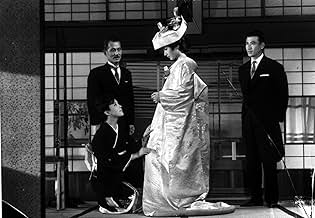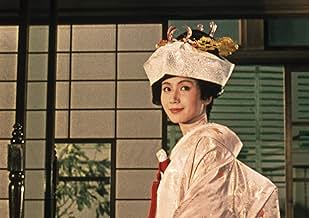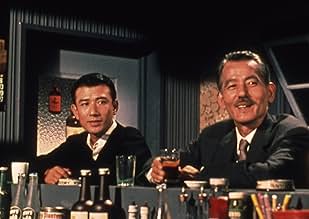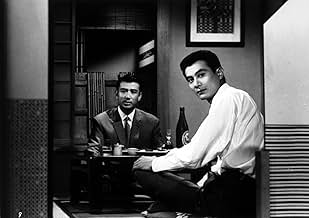Ein alternder Witwer arrangiert die Ehe seiner einzigen Tochter.Ein alternder Witwer arrangiert die Ehe seiner einzigen Tochter.Ein alternder Witwer arrangiert die Ehe seiner einzigen Tochter.
- Auszeichnungen
- 4 Gewinne & 1 Nominierung insgesamt
Empfohlene Bewertungen
Hirayama frequently meets his old friends Kawai (Nobuo Nakamura) and Professor Horie (Ryûji Kita), who is married with a younger wife, to drink in a bar. When their school teacher Sakuma (Eijiro Tono) comes to a reunion of Hirayama with old school mates, they learn that the old man lives with his daughter that stayed single to take care of him. Michiko lives a happy life with her father and her brother, but Hirayama feels that it is time to let her go and tries to arrange a marriage for her.
"Sanma no aji" is the last movie of the Japanese director Yasujiro Ozu about his favorite theme: family and human relationship. Actually he revisits in color thirteen years later, the theme of the wonderful "Banshun". Both story lines are about an old father that realizes that he can not hold his daughter with him anymore and she needs to get married with an arranged marriage as a natural order of life in the traditional Japan. The beautiful and touching story shows also the contrast between the traditional and the newer generation formed by consumers and is supported by awesome performances and the use of magnificent camera work, with symmetrically framed images. Last but not the least, it is impressive how the characters drink in this movie. My vote is eight.
Title (Brazil):"A Rotina Tem Seu Encanto" ("The Routine Has its Charm")
This film features excellent use of color, especially the placement of yellows and reds.
"An Autumn Afternoon" grows on you as you slowly, steadily work your way into the lives of Mr. Hirayama and his family; it's as if the camera were a guest gaining the acceptance of the major characters.
Will Mr. Hirayama come upon his own personal autumn afternoon - a state of philosophical clarity where he can discern things soberly and make a wise and compassionate decision?
A must-see for devotees of Japanese cinema, director Ozu, and those who love quiet, gentle films.
Wusstest du schon
- WissenswertesYasujirô Ozu: [static camera] There is not a single camera movement in the entire film, as in many of Ozu's films.
- Zitate
[English subtitled version]
Yoshitaro Sakamoto: If Japan had won the war, how would things be?
Shuhei Hirayama: I wonder.
Yoshitaro Sakamoto: More whiskey! Bring us the whole bottle. If we'd won, we'd both be in New York now. New York. And not just a pachinko parlor called New York. The real thing!
Shuhei Hirayama: Think so?
Yoshitaro Sakamoto: Absolutely. Because we lost, our kids dance around and shake their rumps to American records. But if we had won, the blue-eyed ones would have chignon hairdos and chew gum while plunking tunes on the shamisen.
Shuhei Hirayama: But I think it's good we lost.
Yoshitaro Sakamoto: You think? Yeah, maybe you're right. The dumb militarists can't bully us anymore.
- Crazy CreditsThe film title and credits are set against a backdrop of painted fronds.
Generally Yasujirô Ozu films have the credits placed before a backdrop of plain sackcloth.
- VerbindungenFeatured in Ozu, der Filmemacher des Glücks (2023)
- SoundtracksGunkan kôshinkyoku
(Warship March)
Written by Tôkichi Setoguchi
Top-Auswahl
- How long is An Autumn Afternoon?Powered by Alexa
Details
- Erscheinungsdatum
- Herkunftsland
- Sprache
- Auch bekannt als
- An Autumn Afternoon
- Drehorte
- Tokio, Japan(setting of the action)
- Produktionsfirma
- Weitere beteiligte Unternehmen bei IMDbPro anzeigen
Box Office
- Weltweiter Bruttoertrag
- 27.189 $



































